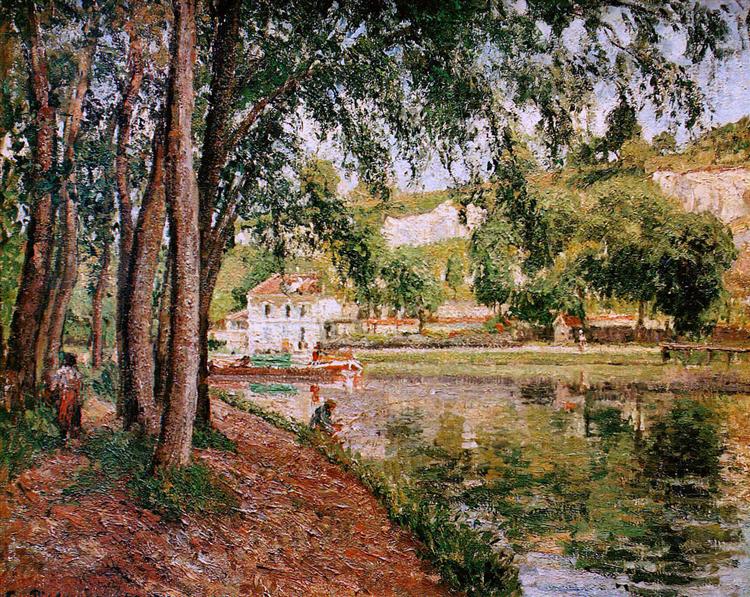Description
Camille Pissarro, one of the central figures of Impressionism, invites us on a delicate stroll through his work "Path Along the Canal de Loing" from 1902, where the essence of his style emerges in a vibrant and poetic way. This painting captures an instant in rural life, a whisper of nature unfolding along the Canal de Loing, an environment that Pissarro loved and frequented. The meandering stream, flanked by robust trees and a morning sky, establishes a dialogue between water and land, a conversation that reveals the harmony between man and nature.
The composition of the work reveals Pissarro's mastery in arranging the elements on the canvas in such a way as to lead the viewer's eye on a visual journey. The path, stretching into the distance, invites one to follow it, while the shadows of the trees contrast with the clarity and light reverberating on the surface of the water. This creates a sense of depth that is characteristic of Impressionism. The loose strokes and use of visible brushwork suggest the immediacy of the moment captured, a technique Pissarro employed to evoke the sense of movement and the changing atmosphere of nature.
Chromatically, it is striking how Pissarro uses a rich yet subtle palette, combining shades of green with flashes of blue and a warm yellow that filters the sunlight. The interplay of these colours not only enlivens the composition, but also establishes a harmony that conveys a sense of tranquillity. The well-defined shadows of the trees provide an enriching contrast that highlights the luminosity and freshness of the landscape. This attention to colour reinforces the Impressionist conception of capturing the fleeting effects of light and atmosphere.
In terms of the human figure, although there are no prominent characters in this work, the subtle presence of a solitary figure at the edge of the road suggests a connection with nature. This figure, who seems almost lost in the landscape, represents the spirit of man at peace with his surroundings. This aspect is significant, since for Pissarro, man, although central, must coexist in harmony with the nature that surrounds him. The inclusion of this solitary figure invites reflection on the relationship between humans and their natural environment, a recurring theme in Pissarro's work.
The work was created during a period when Pissarro was consolidating his distinctive style, influenced by the Impressionist and Post-Impressionist movements. His interest in rural life and everyday scenes is a testament to the artistic movement that sought to break with academic tradition, advocating the representation of the ephemeral and the everyday. Pissarro, a master of light and atmosphere, manages here to encapsulate not only a scene but an experience, a fleeting moment that endures through time.
"Path Along the Loing Canal" is, at its core, a vibrant testament to Pissarro's ability to transform the everyday into something sublime. His ability to capture the essence of the landscape and the creative moment reflects his commitment to observing and celebrating nature. Thus, this work becomes not only a visual delight, but an invitation to contemplate our own relationships with the environment we inhabit. In the context of Impressionism, this painting stands as a clear example of its exponents' desire to explore light, shadow, and the simple life in a deeply emotional and aesthetically rich way.
KUADROS ©, a famous painting on your wall.
Hand-made oil painting reproductions, with the quality of professional artists and the distinctive seal of KUADROS ©.
Painting reproduction service with satisfaction guarantee. If you are not completely satisfied with the replica of your painting, we will refund 100% of your money.

